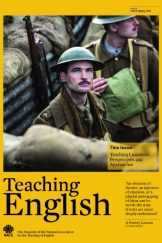 NATE(S) hopes that you are all safe and well in these extraordinary times. The lockdown has focussed us on our development, and new and exciting offerings are on the cards.
NATE(S) hopes that you are all safe and well in these extraordinary times. The lockdown has focussed us on our development, and new and exciting offerings are on the cards.
Thanks to Tom Coles from Portree High School (follow him at @mrtomcoles ), we’ve established a NATE(S) YouTube page and held two webinars, one with Tom discussing Blended Learning and one with Raymond Soltysek on Reading for Understanding, Analysis and Evaluation. Each had over a thousand attendees signing up, and have had almost 2000 views since. Subscribe and watch out for more coming up!
First on the new webinar agenda is a session for new English teaching probationers in Scotland on Thursday 2nd July, but we’re sure there will be something for any new teacher in any subject. A ‘Question Time’ panel will include Sharon Loder, who teaches on the PGDE English course at the University of Strathclyde, and Leanne Welsh, student co-regent and a probationer mentor who teaches in the west of Scotland. They’ll be joined by some current students and probationers. Watch the SATE feed for details and opportunities to pose your questions!
We’ve been discussing ways to take the webinar programme forward with the legendary Kenny Pieper, founder of Pedagoo and so many other good things in education. We have a number of great sessions up and coming, including: Kenny talking about developing personal reading; The Anti Racist Educator collective on anti-racism and the decolonisation of the English curriculum; Holocaust Education in the English classroom; curricular options in the senior phase with James McEnanay; Leanne Welsh on Reader Response strategies in the Scottish Set Texts option for Carol Ann Duffy; and many more! If you have any ideas for sessions or presenters you’d like to see, please get in touch!
We’re also considering having a weekly 40-minute Zoom meeting to discuss pressing issues, possibly in conjunction with the weekly topics set by the amazing English and Literacy Scotland Twitter collective; watch out for that!
Scottish teachers have also been active in the more traditional areas of the work of NATE. Look out for the next edition of Teaching English, which will have an article by new teacher Rachel Sharp, a graduate of the Glasgow University PGDE course, on vocabulary teaching in the BGE English classroom. Rachel summarises her project below. The magazine will also contain an article by Raymond Soltysek on the post-pandemic educational landscape in Scotland and beyond; Raymond will become a regular contributor to the magazine in further issues. If you would like to write for Teaching English, please contact NATE(S) at the email indicated on this site, or the magazine editor, Gary Snapper.
At a time of great uncertainty for us all, this is, paradoxically, proving to be an exciting time for NATE(S). Please consider joining us through NATE; the professional development opportunities it offers are amazing!
Rachel Sharp: Vocabulary Instruction at BGE, Level 3
Summary of Intervention
The purpose of this intervention was to implement a programme of vocabulary instruction in the secondary school English classroom. The approach I adopted focused on three support strategies which incorporated a variety of student and teacher-led learning methods. One of the strategies deployed was a word of the day exercise. At the end of the intervention, students were issued with a vocabulary test comprised of a random selection of 10 words from these exercises. Although this strategy lent itself to easily monitoring students’ learning, it was ultimately limited by a lack of flexibility. There was no option to conduct the test orally or for students to use the words in sentences as an alternative to writing down their definitions. Furthermore, the words chosen for this component of the programme were selected on a lesson-by-lesson basis. This helped to contextualise the new vocabulary within the content of the lesson, but a programme of vocabulary instruction that taught students more about word families may have allowed students to work out meanings for themselves and potentially improved overall final assessment performance.
The second strategy I implemented was issuing weekly homework exercises which were peer-assessed every Monday. These assignments exposed students to four new words and four exercises to reinforce learning. In contrast to the word of the day exercises, the homework assignments encouraged active processing of words and their meanings, particularly activities that emphasised how different words connect to one another. Such exercises required students to use more complex problem-solving skills than the word of the day strategy and subsequently stimulated more class discussion and curiosity. Incorporating peer-assessment into the weekly homework assignments further differentiated this dimension of the vocabulary programme from the word of the day exercises. Swapping booklets with their peers and grading one another’s work gave pupils an opportunity to revisit the new words and take more responsibility for their learning.
The final strategy employed was scheduling five minutes of independent reading at the beginning of each class. This helped to settle students into the lesson, but one of the problems I encountered with this particular strategy was ensuring that students selected sufficiently challenging texts from the school’s library facilities while still fostering the principles of enjoyment and choice. Moreover, some students consistently refused to observe this allocated reading time. One way of overcoming this might be to introduce whole-class daily read-alouds, whereby students are read to orally or listen to audio books while following along with the written text. Such techniques, though removing the element of choice from this exercise, might help to create a more meaningful and engaging reading experience for all pupils.
